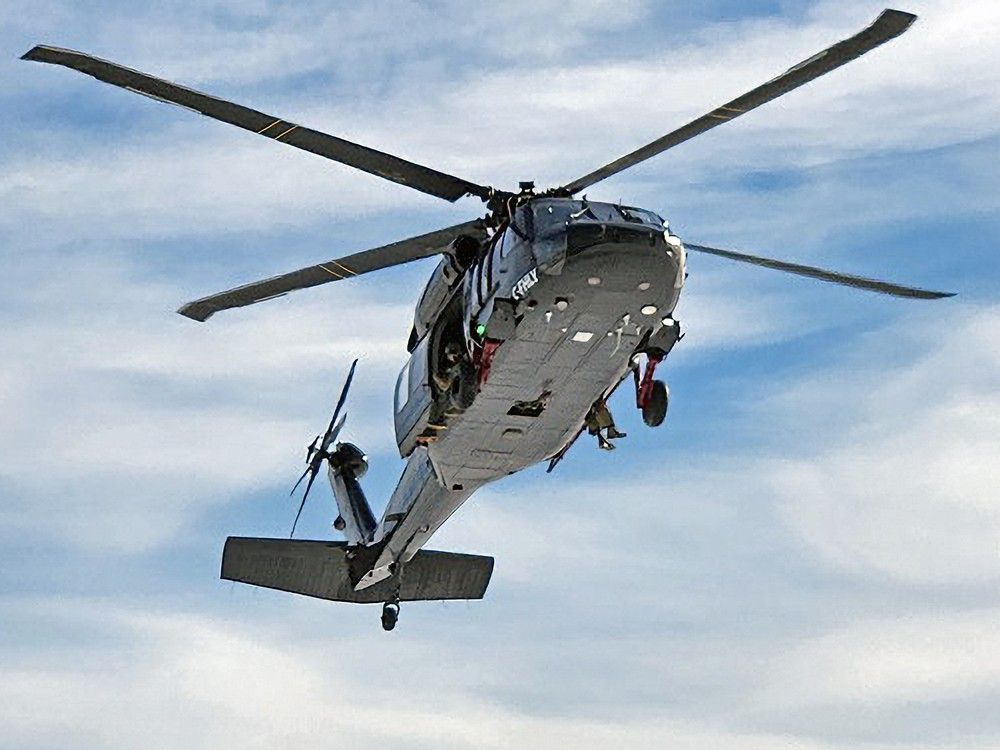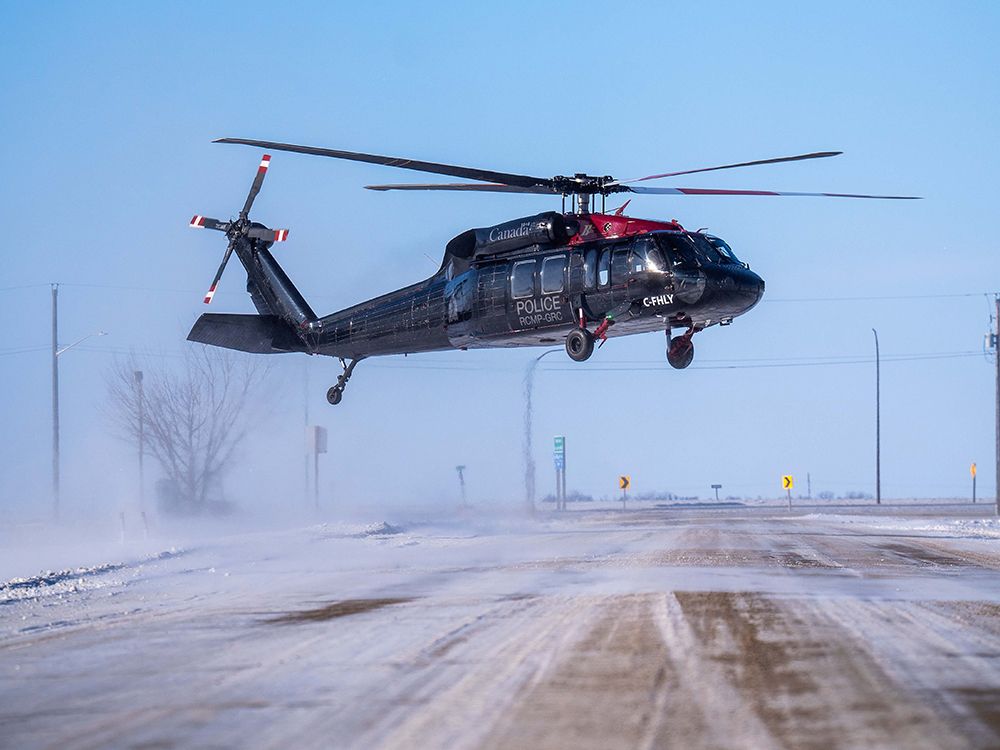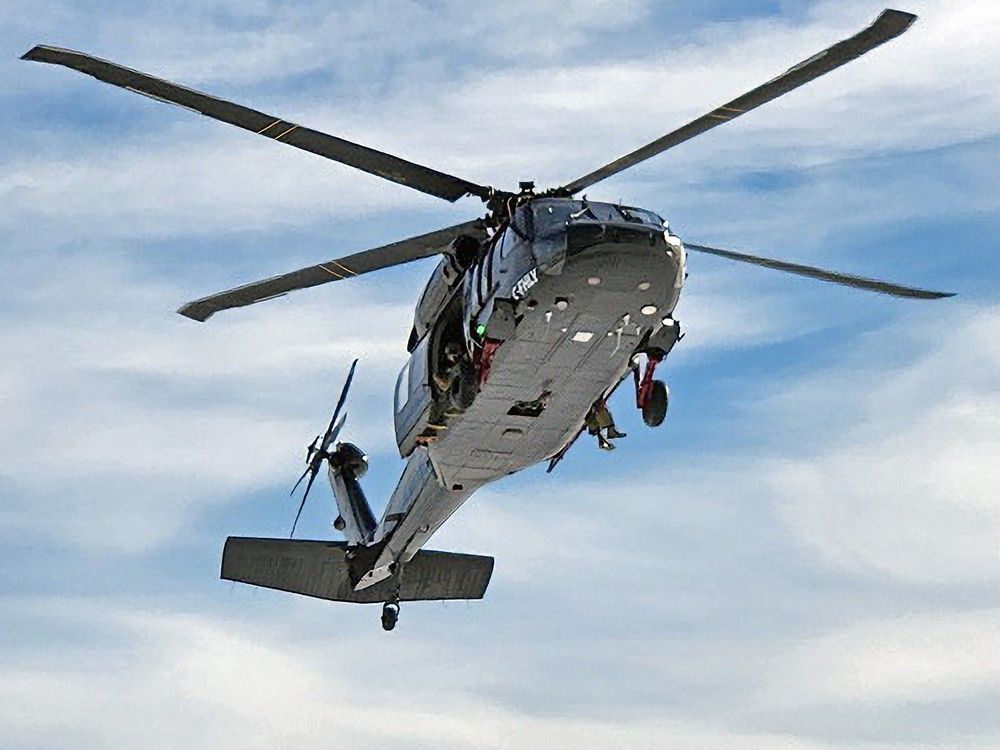
OTTAWA — The RCMP has renewed the contracts for three Black Hawk helicopters to patrol the Canada-U.S. border, despite
accusations by the industry association that the contracts
are the opposite of the government’s “elbows up” approach and that the choppers don’t meet the government’s own safety regulations.
RCMP spokesman Andrew DiRienzo confirmed that the federal police has decided to rehire the three helicopters for at least the next three months. The contracts for the second-hand helicopters, purchased by private contractors after the U.S. military decided to update much of its own fleet, kicked in on Canada Day.
The new contracts follow a National Post investigation that revealed that four Black Hawks were purchased by Canadian contractors who then signed patrolling contracts with the RCMP for three of them. The other was hired by the Alberta government.
The existing RCMP contracts for three of the choppers, worth an estimated $16 million, expired June 30.
Documents showed that the Canadian helicopter industry had accused Ottawa of breaking its own rules, for example, by allowing the used choppers to carry passengers or even flying over developed areas. The Black Hawks have been used mostly to patrol the border in search of illegal migrants, drug smugglers and other illicit activities.
Trevor Mitchell, chief executive of the Helicopter Association of Canada (HAC), said he was very surprised that the RCMP would sign another contract to lease the American Black Hawks, while Canadian manufacturers offer rival products that can do at least as good a job. “I can’t see how any of this transpires into an elbows-up policy, or a Canada-first policy.”
According to the government’s Canadian Civil Aircraft Register, the four Sikorsky Black Hawk UH 60As were imported into Canada between 2022 and last year. They were granted highly unusual special exemptions by Transport Canada that, according to a series of letters to senior government officials from the Canadian helicopter association, allowed the four choppers to do non-military jobs in Canadian air space.
In a March 20 letter to Transport Minister Chrystia Freeland, the association said even the conditions attached to the exemptions have not been followed. “We urge you to direct your department to ensure the safety restrictions attached to these aircraft are strictly enforced for the balance of the RCMP’s contract and that the Force be urged to select a certified aircraft before the contract expires.”
HAC also says that the twin-engine Black Hawks didn’t come with “type certificates,” which act like recipe books for new owners in that they provide details about the aircraft’s parts and how it should be maintained.
Freeland has not responded to interview requests on this subject for the last three weeks. A spokesperson has not responded to specific questions but instead released a prepared statement that emphasized the importance of safety. The statement also said that the exemptions from Transport Canada allowed the aircraft to operate in Canada in specialized roles “subject to strict conditions,” such as not being allowed to carry fare-paying passengers or cargo.
Despite its reluctance to discuss the matter, the federal government is well aware of the situation involving the Black Hawks and the industry’s concerns.

In the spring of 2024, following interactions with HAC, former Transport Minister Pablo Rodriguez directed his officials to pause the issuing of special exemptions for the Black Hawks. But in September of that year, Rodriguez resigned from the federal cabinet to run for leader of the Quebec Liberal party.
He was replaced at Transport for about seven months by Anita Anand, now the Foreign Affairs minister. She was then replaced in the new year by Chrystia Freeland, after Mark Carney became prime minister. Neither Anand nor Freeland has clarified the government’s view of the situation or publicly commented on the special exemptions for the Black Hawks.
Although the Black Hawk contracts pre-date the re-election earlier this year of U.S. President Donald Trump, Canada’s enhanced border patrol is in sync with the White House’s escalation of concern about illegal migrants and illegal drugs entering the U.S. from Canada, Mexico and elsewhere.
But it’s not like there aren’t other – even domestic – options beyond Black Hawks.
Mitchell says Canada has about 200 companies that offer helicopter services and pilots to fly them. Their collective fleets comprise about 1,700 choppers, many of which might be better suited than Black Hawks for patrol duties because they’re smaller and equipped with infra-red cameras that allow them to work in the dark.
The military and the RCMP also have their own fleets. But if the RCMP’s own helicopters weren’t enough, Mitchell said, it would have no problem finding private contractors to help them patrol.
Helicopters are valued for their versatility and mobility. In Canada, they’re mostly used for search and rescue, fighting forest fires, helping combat floods, and commercial applications in remote areas such as mining and electrical lines.
But five-seat helicopters are typically used for patrol because they’re more nimble and cheaper to operate than a larger, 14-seater such as Sikorsky’s Black Hawk.
According to a February 10 letter by HAC to RCMP Commissioner Mike Duheme, the choppers have not been approved by Canadian or American authorities for civilian purposes.
The RCMP’s Black Hawk contracts overlap with Carney’s vow to increase Canada’s military spending so that it reaches the NATO target of 2 per cent of gross domestic product (GDP). Carney has also vowed to do more to support Canadian business and to rely less on the U.S.
Industry sources say the older Black Hawks were selling in recent months for about $1 million each, as the market became flooded with supply. The market for used helicopters has grown in recent years as the U.S. military has modernized its fleet, including the purchase of a newer model of Black Hawks, called the UH-60M.
That has pushed a number of older, but still functional Black Hawks to the second-hand market. Prices of new and used aircraft vary widely, depending on a range of factors. But a new five-seat helicopter, including those made in Canada, sells for about $6.5 million, while a new 14-seater, similar in size to the Black Hawks, goes for about $12 million.
Bell Textron, a subsidiary of Fort Worth, Tex.-based Textron, makes commercial helicopters at its Mirabel, Que. facilities. Its lineup of models includes the Bell 412, which could be used for border patrol.
Airbus Helicopters Canada, formerly MBB Helicopter Canada, has a 300-employee site at Fort Erie, Ont. That location focuses largely on sales, repair, engineering and composite manufacturing.
The Black Hawk, made by Sikorsky Aircraft, is a four-blade, twin-engine, medium-lift chopper in the “military utility” product niche. Stratford, Conn.-based Sikorsky was founded by the Russian-American aviation pioneer Igor Sikorsky in 1923.
Carney, meanwhile, issued a statement earlier this month saying that Canada plans to boost its defence spending by $9.3 billion to $54.3 billion. The money will be used on a range of items, including submarines, ships, armoured vehicles and aircraft, as well as new drones and sensors for monitoring the Arctic and seafloor.
In the government’s latest signal that it intends to create some distance from the U.S. since Trump imposed a wide range of debilitating tariffs on Canadian exports, Carney said Canada wants to reduce how much of its defence budget goes to purchases of American equipment. The prime minister has said that about 75 per cent of Canada’s capital spending on defence heads to the U.S.
National Post
Our website is the place for the latest breaking news, exclusive scoops, longreads and provocative commentary. Please bookmark nationalpost.com and sign up for our daily newsletter, Posted, here.
